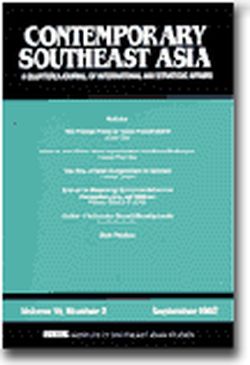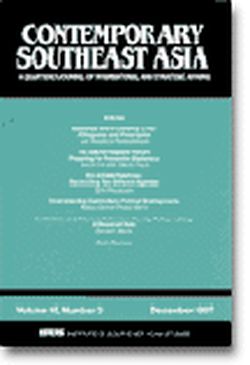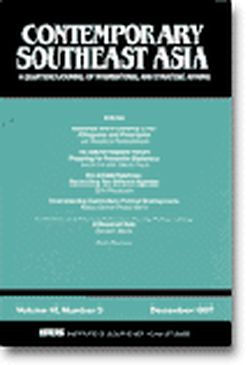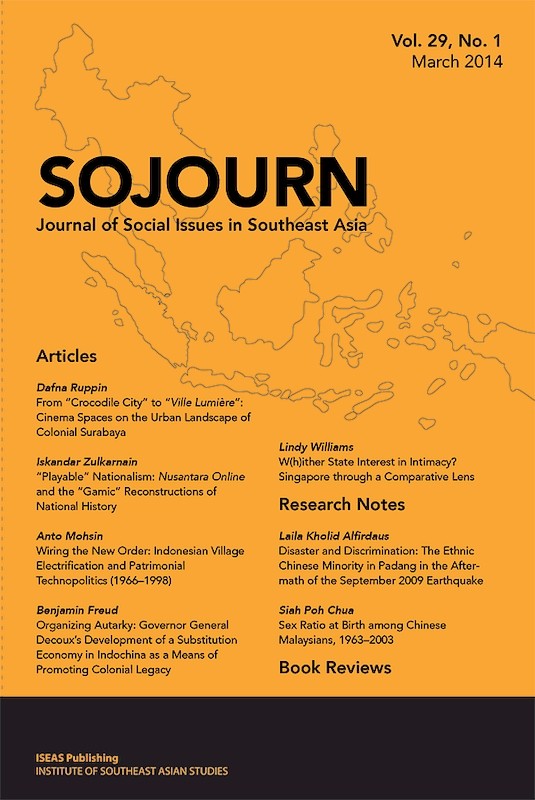Contemporary Southeast Asia: A Journal of International and Strategic Affairs. Vol. 29/2 (Aug 2007)

Date of publication:
August 2007
Number of pages:
394
Code:
CS29/2
Contents
-
Contemporary Southeast Asia: A Journal of International and Strategic Affairs. Vol. 29/2 (Aug 2007)
-
Preliminary pages
- ARTICLES
-
The United States and Its Allies: The Problem of Burma/Myanmar Policy, by David I Steinberg, author see abstractSignificant differences in policies towards Burma/Myanmar are apparent among the United States and its allies: Japan, Australia, Thailand and the European Union (EU). The most restrictive sanctions have been imposed by the U.S., followed by the EU, while Japan and Thailand have been more liberal in their policies. The sanctions regimen, which to date has failed to achieve its goal of regime change, is based on a set of assumptions that opponents of such policies believe to be erroneous. International efforts through the UN to censure Myanmar have been more theatrical than likely to achieve their objective. There is evidence of increased frustrations with the policies that concentrate on political change as a prior condition for greater humanitarian assistance, but changes are unlikely without a significant shift in internal Myanmar policies. The alliances themselves will not splinter because of these differences in approaches to Myanmar. Most likely, changes in Myanmar may evolve slowly within that country from its internal dynamics and contradictions. Myanmar will likely be changed by an internal dynamic that may evolve from the military's dissatisfaction with its own leadership, its own role, or its own sullied reputation. The possibility of violent change in the streets can never be completely discounted. However, it would take an economic catastrophe or some egregious act of ignorance or villainy by the authorities at some level to trigger a popular response.
-
Party Financing in Post-Soeharto Indonesia: Between State Subsidies and Political Corruption, by Marcus Mietzner, author see abstractThis article discusses party financing in Indonesia after the fall of Soeharto in 1998. It shows that the cut in state subsidies for parties in 2005 has contributed to a significant increase in their illicit fund-raising efforts. Most importantly, parties have intensified their endeavours to exploit legislative and executive institutions as alternative sources of income. This trend has not only reinforced the public image of parties as rent-seeking and self-serving, but has also undermined their internal coherence and their ability to carry out basic democratic functions. Building on recent comparative research on party financing, this article points out that most consolidated democracies provide substantial state subsidies for parties in order to counter the kind of tendencies that have emerged in Indonesia. Consequently, while it certainly has its own problems, public party financing appears to be the most effective way to contain the spread of corruption in party politics.
-
Climate Change, Weak States and the War on Terrorism in South and Southeast Asia, by Paul J Smith, author see abstractClimate change is emerging as one of the key security challenges of the 21st century, a challenge that will increasingly have effects in the realm of counter-terrorism. Since January 2002, the United States Government has grounded its counter-terrorism policies within an international/diplomatic framework of well-governed states that have the capacity and willingness to cooperate with the United States. Climate change threatens to undermine this objective. For example, several countries with which the United States hopes to forge long-term counter-terrorism alliances are geographically situated in areas that may be strongly affected by climate change. In Asia, three countries in particular Indonesia, the Philippines, and Bangladesh demonstrate the nexus between possible climate change effects and counter-terrorism. In these countries, increased poverty and reduced state capacity, a foreseeable outcome of predicted climate change events, contribute to the creation or sustenance of functional space which may allow terrorist groups to flourish.
-
Unlocking the Seabed Resources of the Gulf of Thailand
-
Shipping Patterns in the Malacca and Singapore Straits: An Assessment of the Risks to Different Types of Vessel, by Sam Bateman, Joshua Ho, Mathew Mathai, authors see abstractWith the objective of improving the quality of assessments of the threat to shipping in the Malacca and Singapore Straits, this article provides an appreciation of the pattern of shipping traffic and of the types of vessel using the Straits. It is based on the notion that statements about the number of ships passing through the Straits on a per day, per month or per year basis obscure more important assessments about the relative vulnerability of different types of ship. Consideration must be given to the types of vessel, their routes and location. The paper distinguishes between through traffic transiting between the Pacific and Indian Ocean; local traffic operating between ports littoral or adjacent to the Straits; and other vessels, notably fishing vessels, working within the Straits. It identifies the types of vessel using the Straits that are most at risk.
-
The Decline of the Hegemonic Party System in Indonesia: Golkar after the Fall of Soeharto, by Leo Suryadinata, author see abstractThe fall of Soeharto in 1998 marked the end of the hegemonic party system in Indonesia. While Golkar ceased to be a hegemonic party, it not only survived but emerged as the second largest party in the 1999 elections and the largest party in the 2004 elections. Post-Soeharto Golkar differs from the Golkar of the New Order period not only in its electoral strength but also in its structure, leadership, and relations with Islamic groups and the government. Golkar has become more democratic as voting rights have been given to local representatives. While the military's influence has declined if not disappeared, the strength of bureaucrats and big businesses is increasing. While Golkar has embraced Islamic elements, it has also retained its Pancasila ideology. As the largest party in parliament, it has tremendous influence, yet supports a non-Golkar president. The most conspicuous development in post-Soeharto Golkar is the emergence of factionalism that may weaken it.
-
Aung San Suu Kyi of Myanmar: A Review of the Ladys Biographies, by Kyaw Yin Hlaing, author see abstractIt is an undeniable fact that Aung San Suu Kyi has played a critical role in the political development of Myanmar since late 1988 and will remain a very important political figure in the near-term future. Accordingly, those who want to understand Myanmar politics will have to understand her personality, her political philosophy and her role in the political life of the country. Biographies written by Barbara Victor and Justin Wintle detail Suu Kyi's life as the offspring of a national hero, a loving wife and a pro-democracy leader. However, the readers of these two books must understand that there are several myths associated with the political deadlock in Myanmar. While the two authors do mention them, they sometimes confuse rumours for facts. The purpose of this review essay is to provide some context absent from these two books, and identify missing links in some of the issues discussed.
- BOOK REVIEWS
-
BOOK REVIEW: Initiating a Peace Process in Papua: Actors, Issues, Process, and the Role of the International Community. By Timo Kivimaki., by I Nyoman Sudira, author
-
BOOK REVIEW: Political Islam and Violence in Indonesia. By Zachary Abuza., by Greg Barton, author
-
BOOK REVIEW: Rethinking Thailands Southern Violence. Edited by Duncan McCargo., by Robert H. Taylor, author
-
BOOK REVIEW: The Changing Dynamics of Southeast Asian Politics. By Jrn Dosch., by Anthony L Smith, author
-
BOOK REVIEW: Maritime Security in Southeast Asia. Edited by Kwa Chong Guan and John K. Skogan., by Vijay Sakhuja, author




